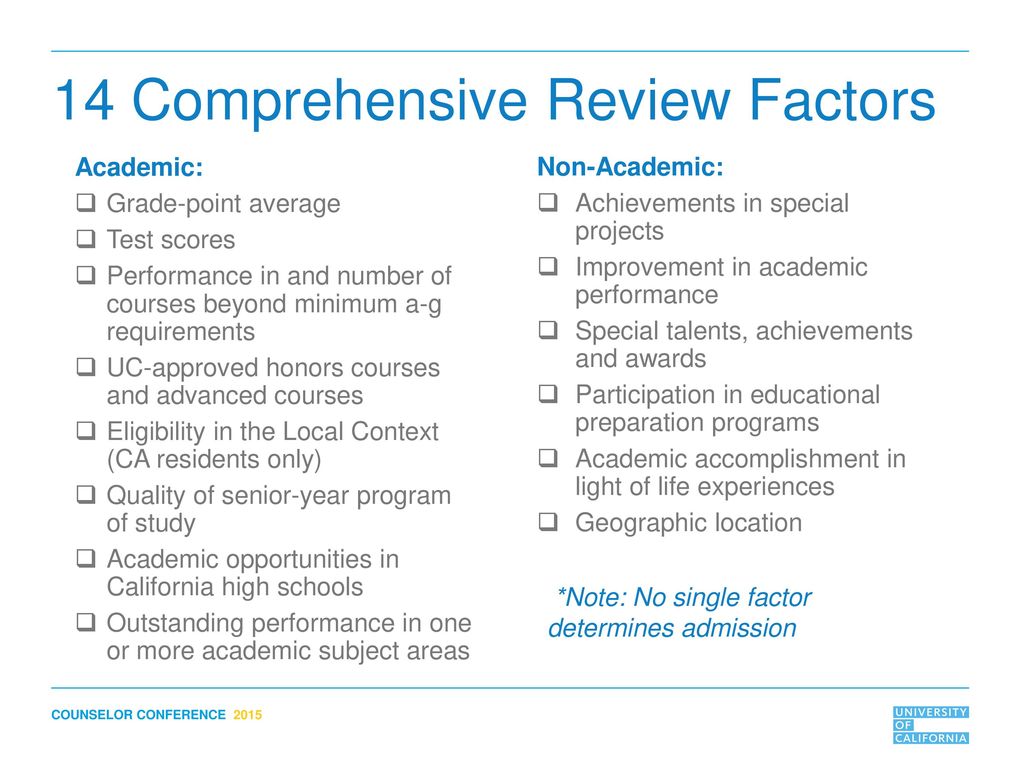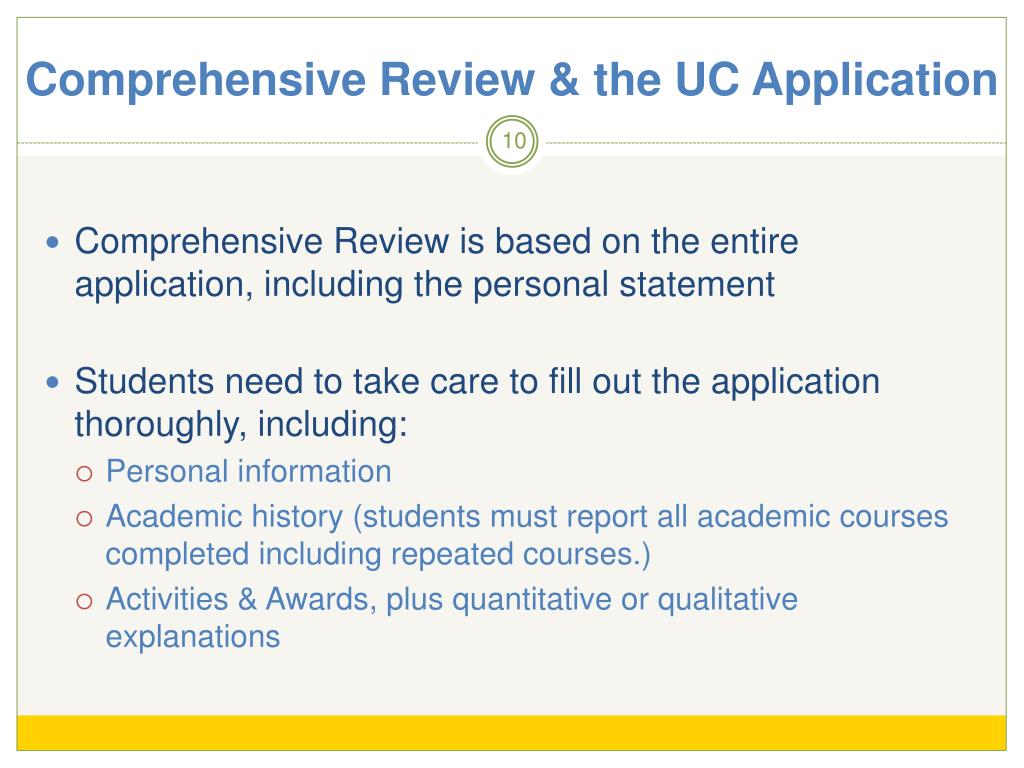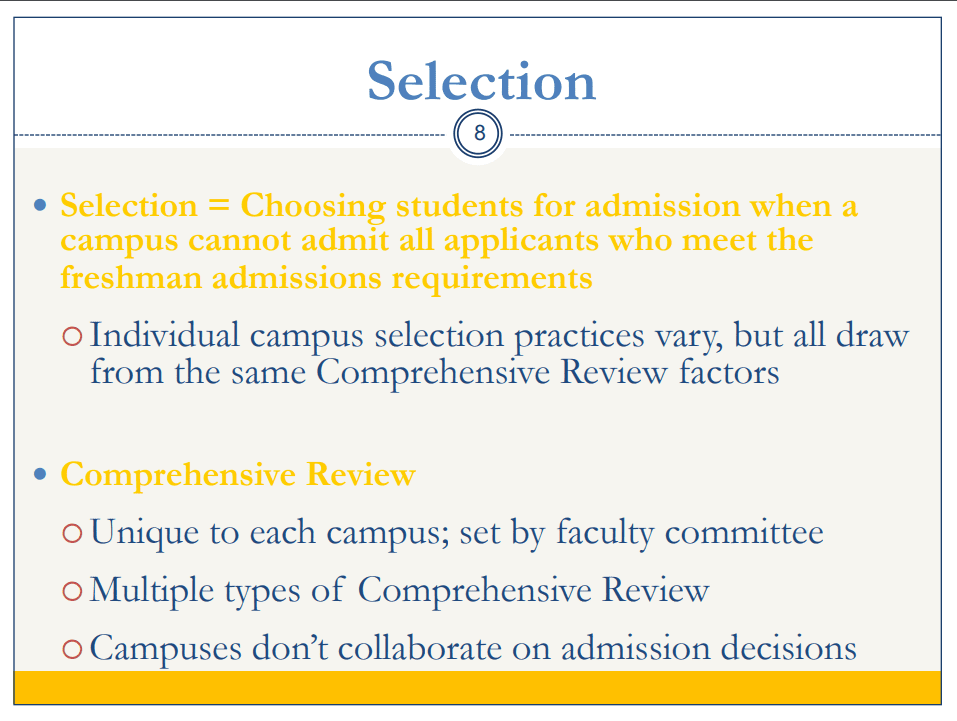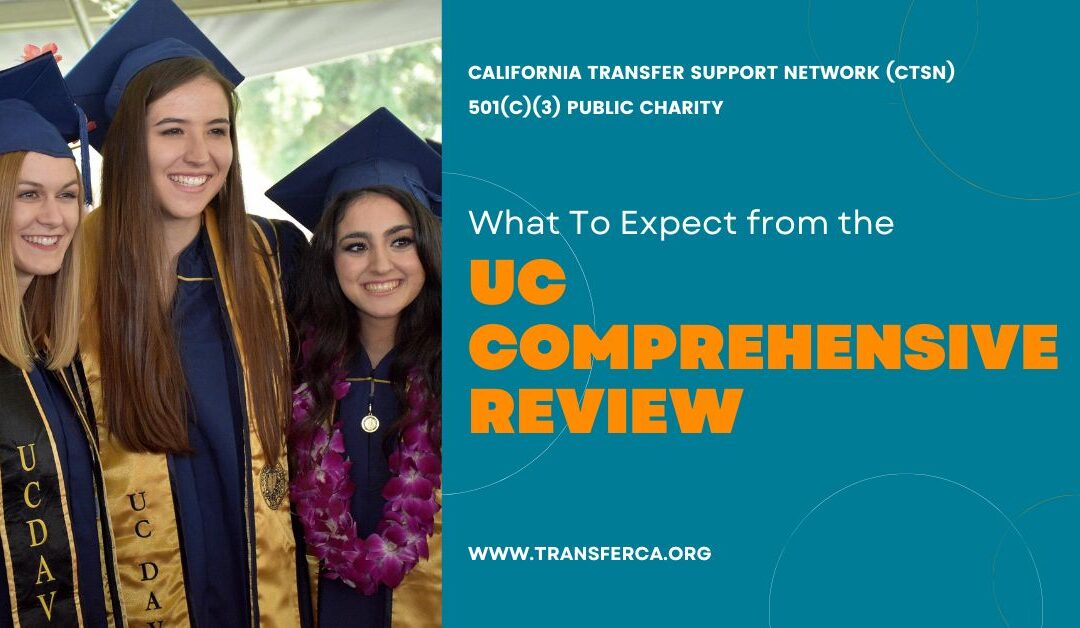As more and more students have been applying to the University of California (UC) in the last decade, all UC institutions have become more selective. In other words, it is harder to get into a UC for all applicants, including California students and residents.
Using a process called comprehensive review, UC admission evaluations will examine factors beyond your initial courses and grades. The UC comprehensive review process will evaluate every student in light of their academic and personal achievements.
In this blog post, we will answer “What is the UC Comprehensive Review” and evaluate the 14 criteria UC admissions officers use to determine whether a student is accepted.
By the end of this post, you will better understand what the UC comprehensive review process entails for freshman and transfer students.
What is the UC Comprehensive Review?
To evaluate an applicant’s academic achievements, evaluators look at multiple factors that include the courses they took and grades they received in comparison to other students. This process is called a comprehensive review.
The UC Comprehensive Review is an important part of the admissions process for University of California (UC) applicants.
Related Reading: Common App Transfer Admissions | Step-by-Step Guide & Bonus Tips
It is a holistic review of each applicant’s entire academic record, personal background, and extracurricular achievements. The UC Comprehensive Review is designed to identify students who have the greatest potential for success at UC.

The UC Comprehensive Review takes into account a broad range of factors, including grades, test scores, transcripts, essays, and letters of recommendation. The UC Comprehensive Review is important for ensuring that UC admissions are fair and equitable.
UC Admission officers will consider academic and nonacademic achievements when reviewing your application. UC evaluators will examine your application from the perspective of opportunities.
More specifically, the UC comprehensive review process allows UC evaluators to objectively look at a point in your life where you garnered an opportunity and made the most of it.
The UC comprehensive review will ultimately come down to how the UC admissions officer relates to the applicant and whether or not they believed the applicant had taken advantage of the opportunities presented to them.
What Does UC Use to Accept or Reject an Applicant?
It is a question that every college student wishes they knew the answer to. Unfortunately, most colleges and universities do not simply tell students what they are looking for in an applicant.
The University of California system is one of the few that does give some guidance. UC evaluates applicants on a set of 14 criteria known as the “Comprehensive Review.”
Below is a list of 14 criteria and elements that the University of California system looks for when determining who to accept into their institution. It’s unfortunate that no more educational institutions provide similar guidance, so students know what they need to work on.
Related: Transfer Requirements for UC Davis Biological Sciences
14 Factors that UC Admissions Officers Consider When Accepting or Rejecting Students
- Grade-Point Average
- Test Scores
- Courses Completed/Planned
- Honors Courses
- Eligibility in the Local Context (ELC)
- Quality of Senior-Year Program Study
- Academic Opportunities in California High Schools
- Performance in Academic Subject Areas
- Achievements in Special Projects
- Improvements in Academic Performance
- Special Talents, Achievements & Awards,
- Participation in Educational Preparation Programs
- Academic Accomplishment Within Life Experiences
- Geographic Location
Do All UC Campuses Utilize These Factors in a UC Comprehensive Review?
Every campus has a faculty committee with overall authority over undergraduate admissions/selection. Each campus uses a comprehensive review, but they get to decide which of the 14 criteria they will use and how much weight each criterion will have.

Furthermore, some UC campuses will enforce comprehensive review mechanisms for one cohort of students but not all.
For example, and as we will not later, the University of California Berkeley (UC Berkeley, UCB, Cal) states on their website that transfer applications are reviewed using a comprehensive review process. In contrast, freshman applications are reviewed more holistically.
UC Comprehensive Review for Freshman Students
Freshman applications are almost always evaluated with the 14 criteria in mind. Although academic achievements and success prevail over everything else, UC comprehensive review for freshman students is focused on the applicant’s performance, motivation, and talent in relation to their high school experience.
In other words, academic success is more important for freshman applicants because it is difficult for UC application officials to signify a comprehensive review where context plays a more prominent role.
Examples of UC comprehensive review factors include:
- Number of Advanced Placement (AP) Credits or UC-Approved Honors Courses
- RIgor of Senior Year Coursework (Measured via Planned and In-Progress Classes)
- Participation in a special project or in conjunction with an event or activity formed at an institution of learning.
- Continued academic accomplishment even with distraction from personal or life circumstances
- Ranked in the Top 9 percent of your high school graduating class (Eligible in the Local Context)
As we can see, students who are interested in enrolling in a UC straight out of high school will have to be competitive for UC admissions.
There are a number of tips and tricks for high school students to be more competitive in the UC Admissions period.
Still, the primary focus should always be on receiving excellent grade marks, finishing general education and “A-G” requirements, and presenting yourself in the best possible light.
Selection is based on holistic review for Freshman applicants, and comprehensive review for Transfers, of all information—both academic and personal—presented in the application.
Uc Berkeley Selection Process
It is recommended that prospective UC Freshman Applicants carefully analyze the 14 criteria for UC admissions to understand how the process works and what you could do to maximize exposure in key areas.
UC Comprehensive Review for Transfer Students
Students interested in transferring to the University of California will have a different comprehensive review experience than Freshmen or International Students.
Rather than focusing on high school coursework and accomplishments, the UC system reviews transfer applications through the perspective of requirement attainment and major preparation work.
Related: 9 Things You Must Do in High School to be Competitive for UC Admission
The UC Comprehensive Review process for transfer students makes the transfer admissions process more competitive and allows transfer students to showcase academic areas they excelled.
In addition to academic indicators, which are weighted more heavily, other qualities and attributes are considered during the UC Comprehensive Review process. The following is a list of examples:
- A complete record of past college courses. Including grade marks, the number of units, and whether or not the course fulfills general education or major preparation requirements (it can do both).
- The qualities UC admissions look for in prospective UC applicants include, but are not limited to: leadership skills, character motivation, intellectual independence, creativity, and a demonstrated concern for others and the community.
- All of those factors can manifest within the applicant in several different ways. Some students engage in organizations and traditional clubs, while others enjoy home life or work-life experiences.
- Another important point for UC comprehensive review transfer students is whether or not the applicant will contribute to the vibrancy and intellectual curiosity that is on campus.
- Suppose a transfer applicant looks to fit the mold of a particular UC campus. In that case, they are much more likely to be accepted as they will undoubtedly contribute to the intellectual and Likely contributions to the intellectual and cultural liveliness of the campus.
- Moreover, UC admission officials can use the UC comprehensive review process to seek candidates that are diverse on a personal level as well as diverse in experiences.
- UC officials like to see transfer students who completed an enrichment or transfer pathway. The UC system has a number of transfer programs that aim to help community college students transfer. Programs include Transfer Admission Guarantee (TAG), AA-T or AA-S for Transfer Degrees, Transfer Pathways, etc.
- UC Transfer applicants, who demonstrated a commitment to completing one of these academic enrichment programs, will be in the good graces of UC admissions officers considering those programs are supported and sponsored by both the University of California and California Community Colleges.

PLEASE NOTE: Race, ethnicity, gender, and religion are excluded from the criteria.
Conclusion
Overall, for applicants who have faced any unusual circumstances or hardships, UC admissions officers will consider those experiences when evaluating your maturity, determination, and knowledge in overcoming those obstacles.
The UC Comprehensive Review process is a way for the UC system to enroll students who have “achievement in context,” essentially taking both academic and nonacademic factors into account when reviewing an applicant.
The beauty of the UC comprehensive review is that every UC campus will have different aspects for judging an applicant based on the criteria the UC selected.
Related Reading: 6 Impacted Majors at UCLA you Should Know About | 2023
The UC comprehensive review system will identify and acknowledge a specific talent or skill a student has that may not be related to their academic pursuits but nonetheless showcase the applicant in a more holistic way.
When students consistently demonstrate an ability to navigate crises, personal circumstances, or extreme hardships, it shows the UC faculty members who are reading your application that you have the tenacity, fortitude, and hallmarks to be an excellent contributor to the University of California (UC) or any other four-year institution.
By assessing prospective UC applicants through the UC comprehensive review process, students who would have otherwise been overlooked can now have their personal accomplishments, high school environment, and family circumstances recognized in the UC application process.
Related: Tips On What To Include in the UC Application Additional Comments
I believe the UC comprehensive review process is beneficial because it reduced the equity gap in college attainment and acceptance between UCs & CSUs amongst minority individuals, what do you think? Let me know in the comments below!




